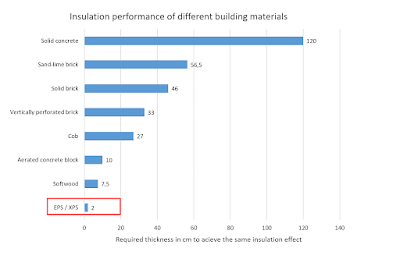Hello and welcome to this blog post in which we discuss one of the many ways in which plastics protect our climate and environment: insulating materials.
Expandable polystyrene (EPS) and extruded polystyrene (XPS)
Most of us are familiar with the material of expandable polystyrene (EPS), commercially available under the brand Styropor [1]. Polystyrene (PS) uses styrene as a monomer which is derived from benzene. Check out here an overview of PS i wrote in the past. Since it provides excellent thermal insulation properties as a foam it is used in many applications such as thermal insulation plates for building and roofing, refrigerators and freezers, and industrial cold storage facilities.
Thermal insulation of houses
The usage of 5 cm thick EPS insulation plates is already enough to reduce the heating effort of your house by half, resulting in saving around 1000 liters of oil per year which represents 2800 tons of CO2 emissions. Comparing the insulation effect of different construction materials, it can be shown that a 2 cm EPS layer has the same insulation effect as a 46 cm solid brick or 120 cm solid concrete (Figure 1).
 |
| Figure 1: insulation performance of different building materials - 2 cm of EPS have the same effect as 120 cm of solid concrete [1]. |
Furthermore, recycling of Polystyrene is possible and EPS/XPS materials support climate protection in several ways: from saving heat energy leading to a CO2 reduction as well as sourcing the Polystyrene from renewable raw materials. Allover, polymer based materials are part of the solution of climate protection and not the problem.
Thanks for reading and #findoutaboutplastics
Greetings,
Herwig Juster
Interested to talk with me about your polymer material selection, sustainability, and part design needs - here you can contact me
Interested in my monthly blog posts – then subscribe here and receive my high performance polymers knowledge matrix.
Literature:
[1] BASF - Creating chemistry issue 12 / 2023
[2] https://www.chemicalsafetyfacts.org/chemicals/polystyrene/
[3] https://www.findoutaboutplastics.com/2017/04/my-top-5-commodity-plastics-for-medical_25.html

No comments:
Post a Comment